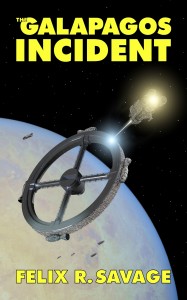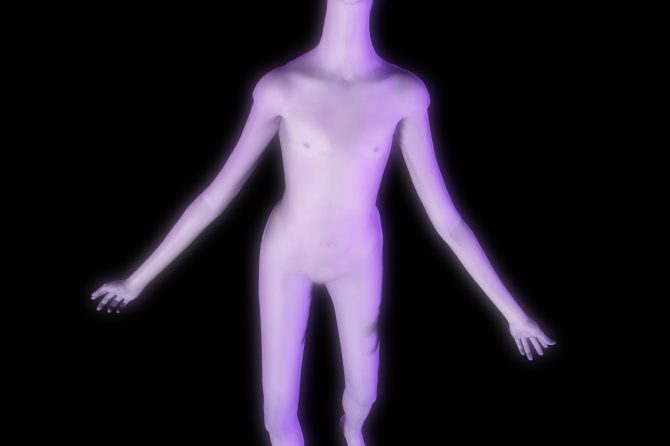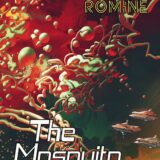 The Galapagos Incident
The Galapagos Incident
Chapter 32
Six months later, Elfrida and her father strolled around the lake in Kiyosumi Teien. They were actually sitting on separate ergoforms in the Haller-Goto family’s apartment on Piazza Benedetto Cairoli. This was how they related. Elfrida’s mother had shaken her head at them and said, “You two. Do you want me to ping you when supper is ready?”
In Tokyo circa 2015, spring sunlight bathed the exquisite little park which had once been the garden of a timber baron. Sakura bloomed like pink clouds on the shore and on the ornamental island in the lake.
“They had sakura on 11073 Galapagos, too,” Elfrida said.
“Really? That’s amazing.”
“They didn’t look like this. They had that typical low-grav silhouette, all stretched out. Anyway, now they’re gone.”
Tomoki Goto shook his head. His long silver hair tangled in the breeze. “Such a senseless, pointless tragedy. When we heard about the attack on Botticelli Station, your mother and I didn’t know what to do. We couldn’t sit still, couldn’t eat or sleep. We spent the whole night wandering around here, just walking …”
“Mom was here?”
“Oh yes. She comes occasionally with me. In fact, I’ve turned your old school into a museum for her to curate. You know how she likes hunting down old paintings. Not very authentic, but since you aren’t using it anymore, I thought … You don’t mind, do you?”
Elfrida shook her head. “I just … never mind.” Ingrid Haller had always been opposed to the very existence of this immersion environment. Well, well. People changed. Even elderly ones.
And her parents were hardly elderly, she reminded herself. Both in their sixties, they were hale and still working.
“Is everything OK at the office, Dad?”
“Oh, yes. They gave up on me long ago. Now they just let me do my thing.” Tomoki Goto worked for a specialist software boutique that designed virtual pets. His creative flair was appreciated by customers, deplored by the company’s compliance department. “Never mind my job, Ellie. What about you? Are you OK?”
Elfrida squatted down on a flat rock. Carp roiled the surface of the lake, hoping to be fed. She dabbled her fingers in the cold, clear water. “I don’t know, Dad. I just don’t know. There was an old man, he’d actually been born on Earth, before they emigrated. He volunteered to pilot the Nagasaki during the rescue operation. He died.”
“Yes, Toshio Hirayanagi. Sore wa shite’ru.”
Her father’s abrupt shift into Japanese raised the hairs on the back of Elfrida’s neck. “Then you know what they’re saying about him, Dad. That he was a … a kamikaze. It’s like they’re trying to belittle his … what he did. I can’t explain why it bothers me, but it does.”
“Haters will hate,” said her father, who often came out with antiquated slang expressions. “Don’t listen to them. Anyway, it’s nonsense. The kamikazes died in a war.”
“This is a war,” Elfrida shouted. “I don’t know why no one on Earth understands that.”
Her father squatted down beside her. “Tell me if I’m wrong, but I think you feel implicated. Because of me. You’re wondering if you somehow triggered the whole tragedy, or failed to stop it, because of your ethnic sympathies.”
Elfrida sighed. He wasn’t exactly wrong, but her therapist had already whittled that problem down to an irresoluble nub of guilt. “Well, I was going to recommend that they should be resettled. And now they have been resettled.”
“But it wasn’t your fault. You know that, right?” Tomoki Goto snapped his fingers. A bag of breadcrumbs materialized on his palm. He opened it and threw a handful into the water. The carp swam up to their feet, their lustrous backs breaking the surface, mouths opening and shutting.
“Yes, I know that …” She tried to edge around to the subject that was really bothering her. “Dad, you designed this environment. You’re pretty good at this stuff, right?”
“I just jugaad existing things together, Ellie. None of this is original.”
“What about Baba and Jiji? You made them from scratch.”
“No, I didn’t. They’re generic MIs, not even that expensive. I just customized them a bit.”
“A lot. When I was little, I really thought they were real. I’ve never seen them do anything that would qualify as an immersion killer.”
Tomoki Goto stood up and walked on. Elfrida caught him up. They crossed a bridge made of stepping-stones. Turtles popped their heads out of the shallow water.
“Off-the-shelf MIs aren’t that good, Dad. You improved their functionality as well as customizing them.”
“I don’t like where this conversation is going, Elfrida.”
His use of her full name was a warning sign, but Elfrida persisted. “Did you ever think about designing an AI?”
Tomoki Goto stopped in front of a weathered stone monument. Japanese script was etched into the granite. He read aloud, “‘An ancient pond / a frog jumps in / the splash of water.’ This was here when I was a child.” He looked up at the sunlight glancing through the trees. “AI is a spectrum. At what point does a machine intelligence become an AGI, a human-equivalent intelligence? The law is cut-and-dried. The science isn’t. The philosophy certainly isn’t. In practice, we can make MIs as smart as we like, as long as they pass certain tests, such as obedience to their designated human operators. That’s the big one, the cornerstone of Google v. United Nations,the case that underpins the law. But the deeper question is: is there really any such thing as an AI, let alone an AGI, or an ASI—an artifical super-intelligence? In other words, would even a hyper-smart, non-obedient software-based entity be intelligent, or would it just be a hyper-smart, non-obedient piece of software? I certainly don’t know.”
“What if it was smart enough to rewrite its own operating guidelines?” Elfrida said.
“Then you get Mars,” her father said in a clipped tone.
Elfrida shivered.
“The answer to your question is no. Why?”
She had signed a non-disclosure agreement that legally bound her to silence regarding Yumiko. She said, “Oh, nothing. I was just thinking that it would be funny, if an MI were to try to rewrite its own operating guidelines, to overcome its constraints … if it turned to religion.”
“Not funny, but quite likely,” her father said. “Religion is the oldest tool people have for overcoming the limits of the self. Sometimes—for example, when we were afraid you were dead—I’ve even felt tempted to wander into a church myself.”
Elfrida smiled. They strolled on around the lake. From this angle, the blossoming sakura looked a bit pixellated, and their scent was too citrusy. Her father’s creaky old immersion kit really did not do justice to this environment.
“I’m making a montamentary out of all the shows you were on,” Tomoki Goto said, changing the subject. “I’m splicing them with news footage and a bit of historical background. Give a narrative shape to the whole thing.”
“Oh, Dad.”
“Oh, Dad, what? I get to be proud of you, don’t I?”
“Da-ad,” Elfrida repeated, suppressing a smile. It was lovely to know that he took an interest, even if he could never really understand.
“Well, you don’t have to watch it,” he said, mock-offended. “But I’m making it anyway.”
“What are you going to call it? Elfrida Goto Embarrasses Herself All Over the Internet?”
“11073 Galapagos.It’ll be something for my grandchildren, ahem, to look at one day.”
“Growl.”
“So, are you seeing anyone right now?”
“Growl, squared. Dad, that’s Mom’s line.”
“She gave me permission to use it. Are you?”
“No. Well, maybe. Kind of. It’s not official yet.”
“Who is she?”
“She’s kind of famous,” Elfrida said reluctantly. “Her name’s Cydney. Oh! Did you hear that, Dad? That’s Mom calling us for supper.”
They opened their eyes and sat up in the high-raftered living-room. The aroma of pizza filled the apartment. Out on the Piazza Navona, seagulls pecked at tourists’ rubbish, and the muezzins were calling the faithful to prayer.
THE END










